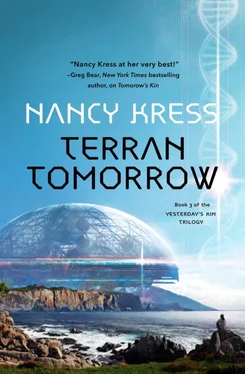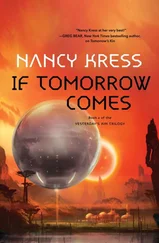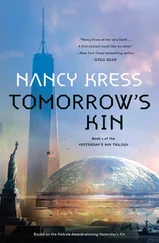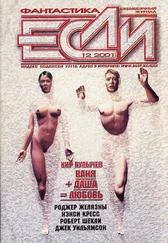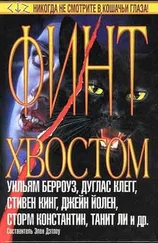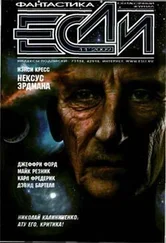“You won’t intervene to save their lives?”
“Are they in danger of imminent death?”
She hesitated. “No.”
Claire Patel was always honest; that was why he’d asked her that question. Jason said, “Is their work yielding any useful results?”
“Not yet.”
“Will it?”
“I don’t know.”
More honesty. Jason almost said, “Dismissed,” but not only should he not do that, it wasn’t necessary. Dr. Patel turned to go. But she had one more parting shot.
“Colonel Jenner, your grandmother has woken up. She’s not young. I hope she doesn’t overwork herself in the lab, as well.”
* * *
Marianne was not in the lab. She sat with Colin in the conference room. A group of Settlers had been in there with him, discussing plantings for the garden that had to be created all over again outside the dome since, while Marianne had been comatose, there had apparently been a terrible battle. Colin asked the Settlers to leave the room and they had, trailing children and bits of environmental conversation. Colin sat in a powerchair, his injured leg in some sort of cast, regarding his grandmother with intense curiosity.
“No,” she said, “you first. Tell me everything that happened while I was comatose. How were you hurt?”
He did. Part of her mind listened intently, although it was an effort to slow comprehension to the speed of his words. The rest of her mind kept evolving the thoughts that had seized her since she’d woken up four hours ago.
Night in the dome—dim lights, soft breathing beyond closed curtains, solitary footfalls in the corridor. She lay in the v-coma ward, yes. A narrow bed, a green Army blanket that was too warm. She didn’t move it yet. She lay absolutely still, mental fingers that were still Marianne tentatively touching her new mind, as if it were a lab specimen.
It was not. It was her. She was not fragmented, not fundamentally different. But her thoughts ran on parallel lines simultaneously, and the tracks crossed and recrossed, making connections she could not have made before. The image came to her of a yarn sculpture she had seen once, long ago, so intricately and fantastically knotted that each strand seemed to connect to every other in ways that her linear mind could not conceptualize.
Linear no longer.
She lay there for three hours, making neither movement nor sound, knotting strands. Her old watch, still on her wrist after journeying to the stars and back again, glowed with the time. Eventually, a nurse moved silently through the curtains.
“I’m awake,” Marianne said.
The nurse brought Lindy Ross. Marianne submitted to Lindy’s examination but said little. Lindy finished by saying, with unnecessary force, “Marianne, you must eat. Your brain is now using more glucose, and you are already in ketosis. I’m going to send food in here now.”
“All right,” Marianne said, and for the first time, Lindy smiled.
She ate. She walked up and down with an orderly, until he was satisfied that she would not fall. She dressed in her own clothes, which she found in a plastic bag under the bed. She wanted to talk to someone, but not Lindy, who had seemed agitated and distracted. Someone who might understand the thoughts in her head. Zack McKay was, Lindy said, asleep—“Finally!”—and shouldn’t be disturbed. Jane was still comatose, Ka^graa too hard to talk to without Jane’s translations. Claire, the nurse said, had gone to Enclave Dome. Dr. Steffens was here, but apparently she would not leave her lab work to talk to anyone, even Jason. Jason himself was out of the question. He would listen, but he would not care about the topics knotting themselves fantastically through her brain.
Ryan? No. Marianne loved her son, but he was now more frail than she had ever been.
She slipped out of the ward and asked a startled soldier on his way to the mess, “Where can I find Colin Jenner?”
“Ma’am?”
“Colin Jenner,” she said patiently. “Please find him and then take me to him.”
He hesitated, evidently weighing his choices. She was, after all, the CO’s grandmother. He said, “Yes, ma’am,” and delayed his breakfast long enough to hunt up Colin in his Settler meeting and take Marianne to him.
When Colin had finished his recitation of attacks and counterattacks; of his and Lindy’s supremely stupid, brave attempt to get a message to the signal station; of ship repairs and comas and awakenings, he said, “Grandma, tell me how it feels.”
That was Colin—feeling before all. She said, “It doesn’t ‘feel’ like anything. I just think differently. Faster, more deeply. Colin, do you remember when you were small and were fascinated with elephants?”
“Of course. I drew them all the time.”
“You did more than draw them. You made up stories about them, you talked to pretend elephants, you dreamed about rescuing an elephant in a basement, like in your favorite picture book.”
He smiled. “I remember.”
“I want to tell you about genetic evolution. After all, that’s what I am, an evolutionary geneticist, the only one here at the base. Evolution is a process, but not an evenly paced one.”
“I know that much,” Colin said.
“I’m rehearsing here, Colin—trying to find the one strand to explain it simply.” And each idea—almost each word—led to other strands, other ideas. Her task now was to separate out the ones that would make sense to nonscientists. This was urgent.
He said, “You’re trying to find the words to explain it to Jason, when he’s being Colonel Jenner.”
Even as a child, Colin had been quick to perceive the cues in human relations. Marianne took his hand where it rested on his knee, above the cast on his shattered leg. Her deeply veined hand squeezed his muscular fingers, on which his Settlement sunburn had mostly faded. She unknotted strands of thought in her mind, knotted them again, pruned and simplified.
“There are three parts to what I want to tell you. First, that punctuated evolution led to long periods where nothing much seemed to change in human beings, followed by rapid change. Five or six million years ago, proto-humans diverged from apes. Two hundred thousand years ago, by some estimates, toolmaking began. A hundred thousand years ago, modern humans emerged in Africa. Seventy thousand years ago, the first cloud of R. sporii hit Terra, wiping out most of humanity except those with natural immunity—which is why Worlders aren’t immune. They’d already been taken from Terra to World by the so-called super-aliens. About forty thousand years ago, the Great Leap happened—Colin, are you following this?”
“Every word. I already knew it, you know. And so does Jason.”
“Just bear with me. Humans had had a long period of cultural stagnation. Really long. Then, during the Great Leap Forward, modern humans started burying their dead with funeral rituals, making clothing with bone needles, carving buttons and fishhooks, creating jewelry and art. By thirty-six thousand years ago, they had fertility figurines and cave paintings and musical pipes.
“Some equivalent of the Great Leap must have occurred on World, too, or humans there would have stayed at an earlier stagnant level. I’ll come back to that.”
Colin nodded. He turned his head slightly—hearing something that she could not? Marianne didn’t interrupt herself to find out. She wouldn’t lose her line of thought, but he might.
“That’s the history, or a brief version of it. Second comes the genetic part. This is all known science. Our divergence from apes correlates with multiple mutations in a region of the genome called HAR1—human accelerated region one. The human brain developed a much wrinklier cortex, to mention just one change. Other mutations in other genes correlate with other advances. One of them—this is important—is a gene called ASPM, on chromosome one, which has mutated fifteen times in the last six million years, and the mutations seem to correlate with milestones in human evolution. The last mutation occurred along with the development of agriculture and sophisticated writing. Of course, mutations can be destructive, as well—an ASPM allele causes microcephaly in fetuses, who are born with small brains—in fact, brains exactly the size of Australopithecus africanus a few million years ago. And changes in one gene can affect others. ASPM is seminal . It affects the division of cells in developing brains. It affects other cells. It affects coding in IQ domains of the human genome.”
Читать дальше
